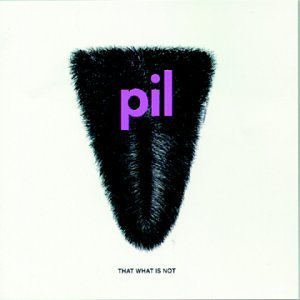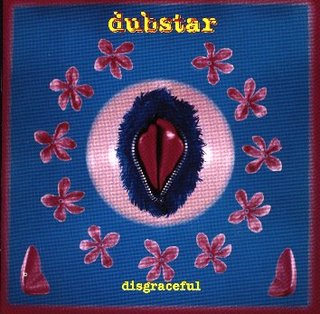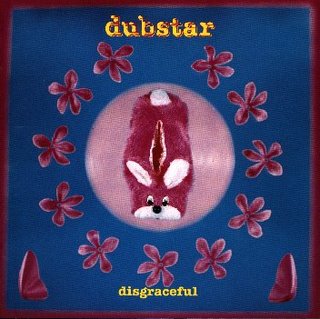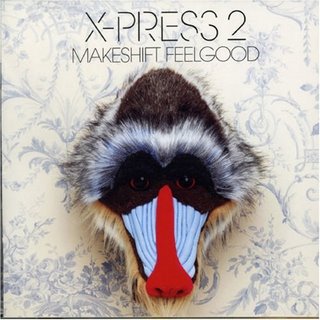Scissor Sisters, "Might Tell You Tonight" (2006)Not that he would actually care what I think, of course, but Jake Shears might titter to hear me pronounce
Ta-Dah to be, not a show-er, but a grow-er. The second Scissor Sisters album has been out (or "available") for a few weeks now, so mine is a belated pronouncement, but you can't declare something a grower except belatedly, can you? No, you cannot. It was tempting to dive in and write about
Ta-Dah a day or two after it ended up on my iPod; in retrospect, I'm glad that I didn't. I wish I could say that I refrained because I, in my infinite wisdom, knew back then that the record needed more spins. But the banal truth is that I found the album so underwhelming and unworthy of ink after those initial samplings that I just put it aside.
I was mostly wrong. The question of "first impressions" (or relatedly, "immediacy") is an interesting one for pop music, and particularly so in the case of
Ta-Dah. Strikingly, the people who didn't like the album right after its availablity were reasonably unified on why they didn't -- why
we didn't, since I shared those opening impressions. I'm not going to suggest that all those impressions are wrong, nor, for that matter, that all of them are right -- it is, it won't surprise you to hear, a bit of both -- but I do find, as usual, the critical reactions fascinating, and the reasons for those impressions intriguing.
Scissor Sisters has always drawn on two eras and sounds for inspiration, and early dismay about
Ta-Dah revolved around the idea that a whole side of the band was missing. On the first album, the Scissor Sisters sound was roughly but almost neatly split between 70s soft-rock ("Laura," "Take Your Mama," "Mary," "Music Is The Victim," "Return To Oz") and 80s synthpop ("Comfortably Numb," "Lovers In The Back Seat," "Tits," "Filthy," "Better Luck," "Can't Come"). Several commentators argued that
Ta-Dah ditched the latter sound, a move that, furthermore, has political implications: given that the 80s electro numbers were often the campier ones in the Sisters' arsenal, this even led some writers to suggest that the band was selling out, either because they're
subscribing to rockist ideas and opting for a more commercial (for the US?) rock sound, or because they're
de-gaying themselves.
The album did initially strike me as lacking electropop, but, now, a few weeks down the line, this feels less empirically true. But I think there's a reason why that first impression was created, however, and it has to do with the sequencing of the album. While
Scissor Sisters mished-and-mashed the 70s and 80s influences (perhaps even jarringly: to this day, I'm a little jolted when I hear the bleepy opening of "Comfortably Numb" right after the stomp of "Take Your Mama"),
Ta-Dah more or less splits them over two halves. Tracks one to six (from "I Don't Feel Like Dancin'" to "Intermission" are indeed very 70s; because the album's therefore frontloaded with that sound, it's easy to overlook the way its second half gets a bit more electro. "Kiss You Off" kicks off this stretch, and the next three tracks ("Ooh," "Paul McCartney," and "The Other Side") are more electro-disco than you think. (Though not entirely: one internal "problem" with "The Other Side" is the way it begins with a shimmering synth riff, only to then feature not one, but two very 70s interludes: first, a slide guitar solo, and then a sax solo. Those stick in your mind, if not your crawl. It took me a few listens before I classified the track as a fundamentally electropop number with some unfortunate 70s touches, rather than the opposite.) The record does return to a more 70s rock sound with the two closing tracks (including the tragic "Everybody Wants The Same Thing," which I disliked then and now), and this does further cement the impression of the album being too focused on rock. It's unlcear why the Sisters decided to structure the record this way -- although the move makes a bit more sense if we supposed that the band, in keeping with their aesthetic, have conceived of the album as a piece of vinyl with two sides.
But the sequencing is only partly responsible for creating this largely erroneous idea that the Sisters have ditched half their sound. In baseball (wait, come back! It's just a metaphor!), people sometimes talk about pitchers losing their effectiveness when they fall too much in love with a pitch, which they then proceed to overuse and thus fail to surprise their opponents. On
Ta-Dah, it feels like the group has fallen in love with two things. One of these is the piano vamping riff -- you know the one, in which the pianist pounds away like he thinks he is, and on several occasions, actually
is, Elton John -- or the rhythm modelled after it. (I think this is
what XOLondon meant when he said that the band is stuck in a plonkety plonk groove.) The problem with the first half of the album is not just that it sounds too 70s, but it sounds 70s in a quite specific and monotonous way. Even on "I Can't Decide" and "Intermission," which owe something to, I dunno, 1920s burlesque music as well, the pianos follow a rhythm that isn't very distinguishable from the ones on "She's My Man" (which in turn is almost a straight rewrite of Elton John's "I'm Still Standing"), and "Lights" (which sounds to me like Don Henley's "Dirty Laundry"), the most 70s of the tracks. I've since come to enjoy the first half of the album quite a bit, and find even the next single "Land Of A Thousand Words" a great lighters-in-the-air ballad, but I can also understand why I initially found it a bit of a dreary headache.
If Scissor Sisters have fallen a bit too much in love with the piano vamp and its rhythm, they have also come to rely too much, and too indiscriminately, on Jake's falsetto. It's very difficult, I think, to express different emotional shadings while in falsetto; as a result, that tone is most effective when contrasted to a natural voice (when I reviewed some singles for
Stylus magazine's jukebox this week [subtle self-pimp!], I snarked about how Jake had forgotten this fact). On the first album, part of what made "It Can't Come Quickly Enough" such a delectable song was the way Jake shifts in and out of the high notes; when he reaches the chorus and tells us that "it
can't come quickly enough, now you
spend your life waiting for this moment," the quiver from the falsetto expresses, as even words cannot, the tremulousness of the dreams. In contrast, on something like "I Don't Feel Like Dancin,'" Jake's decision to sing the whole song in falsetto means that there is no explosiveness, so the track feels oddly flat. (Imagine a version with the verses
au naturel, and, then, with a laser sound effect, the song bursting, only then, into a higher-pitched "Don't feel like dancin'! Dancin'!"). On "Might Tell You Tonight,"
a lovely banjoesque song that perfectly captures the sweet tentativeness of the moments when you are contemplating telling someone how you feel about him, Jake doesn't technically use his falsetto, but you will be able to notice the different "tones" of his voice on the verses (rougher) and chorus (gentler and sweet). Somehow he cannot do that in falsetto, and the album sounds poorer as a consequence.
The overuse of falsetto is also the reason, I suspect, for another early complaint about
Ta-Dah: its supposed lack of songcraft (
the Stylus review: "what's missing are the tunes"). Again, this is an opinion I shared in the early going, but no longer do. I think it's easy to overlook the melodic variation and dexterity of the album because Jake's falsetto, once again, pancakes those qualities; you barely notice the song "Lights" going from verse to chorus, because Jake singing both parts in fairly close tones means that the key change gets buried. On almost all of the songs, indeed, the middle eights totally sneak by for the same reason.
In the final reckoning,
Ta-Dah isn't a perfect album. There are some points on which I
haven't changed my mind in the intervening weeks. For example, there's another sense in which "a whole side of the band is missing," in that,
as XOLondon also noted, Ana Matronic doesn't feature enough. She gets "Kiss Me Off" as her big solo number, of course, but her absence continues to bug -- especially since some of the songs could easily have been (nay, should have been) duets. "Ooh" is the most obvious, since we know that there is a version with Kylie's vocals, but a back-and-forth repartee between Jake and Ana would have also been welcomed on a track like "I Can't Decide" ("I'll kill you! No, I'll kill YOU!" Look, I don't ask for
sophisticated repartee). Also, the bonus disc continues to be shit.
But, even though
Ta-Dah isn't perfect, it's also become clear to me that many initial judgments about the album -- judgments that I'm not arguing are wrong, and in fact have tried to point out are "justified" in the sense that they are produced by the record, and particularly by the band's over-reliance on two of their musical tricks -- are worth revisiting. So, you know: go listen to the album again. Start from side two, perhaps. Maybe use your iPod shuffle function to mix up the track order. Auto-correct Jake's pitch to remove, not all, but some falsetto. Listen, again.






